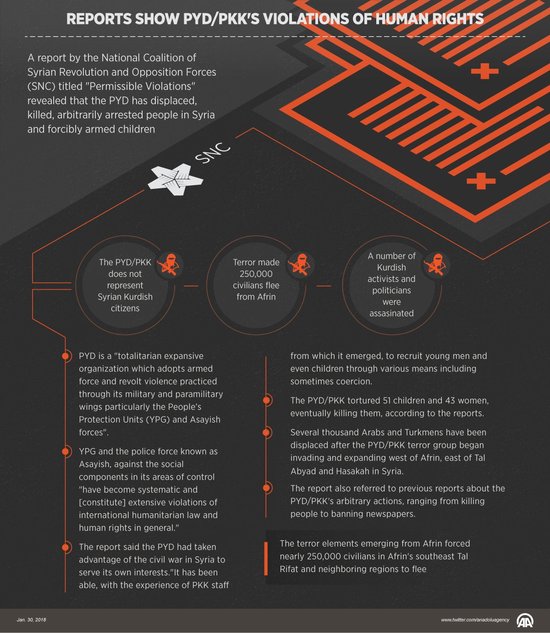The terrorist organization PKK's Syria branch PYD continues to violate the human rights in the areas they have managed to occupy, reports have shown.
A report by the National Coalition of Syrian Revolution and Opposition Forces titled "Permissible Violations" revealed that the PYD has displaced, killed, arbitrarily arrested people in Syria and forcibly armed children.

The 93-paged report's introduction stresses that the PYD is a "totalitarian expansive organization which adopts armed force and revolt violence practiced through its military and paramilitary wings particularly the People's Protection Units (YPG) and Asayish forces".
"It does not represent the Syrian Kurdish citizens even through it claims to speak for them," it says.
The report said the PYD had taken advantage of the civil war in Syria to serve its own interests.
"It has been able, with the experience of PKK staff from which it emerged, to recruit young men and even children through various means including sometimes coercion.
"The PYD works in coordination with the PKK, which is globally listed as a terrorist group. It is -- according to investigations -- an integral part of the PKK's strategic apparatus, similarly adopting violent revolt principles, the same approach and even sharing staff," said the report.
'Arbitrary arrests, violations and assassinations'
"However, it has adopted the name PYD to avoid the international classification PKK which has had a strong relationship with [Syrian President Bashar al-]Assad's regime since the 1980s, as the regime gave it the opportunity to stay and train in Syria between 1988 and 1998.
"It was allowed to use Syrian territories to launch attacks on neighboring countries and recruit as many Syrian Kurds as possible. [Jailed PKK head Abdullah] Ocalan, unlike other Kurdish parties, did not see 'any existence of Kurdistan in Syria'; he maintained that Kurds were there due to war and displacement. This is why Ocalan's rivals accused him of exploiting the poor and that his leaders were connected to Iran and the Syrian regime," the report added.
To highlight the PYD's arbitrary arrests, violations and assassinations in order to consolidate its control, the report referred to the killing of Kurdish activist and politician, Mashaal Tammo, leader of the liberal Kurdish Future Movement Party in October 2011, in Qamishli, which borders Turkey.
"Tammo saw Syrian Kurds as a genuine part of the Syrian people. He was assassinated in Qamishli in October 2011. The case was filed against unknown person," the report said.
The report said "breaches" perpetrated by the Democratic Union Party (PYD) and its armed wings, chiefly the YPG and the police force known as Asayish, against the social components in its areas of control "have become systematic and [constitute] extensive violations of international humanitarian law and human rights in general."
"These violations represent a blatant aggression on public freedoms, [...] freedom, and protection and freedom of expression including attempts to manipulate the demography in its areas of control. Such practices were a factor that contributed to the transformation of the Syrian people's peaceful revolution into an armed conflict on different levels," it added.
The report also referred to previous reports about the PYD/PKK's arbitrary actions, ranging from killing people to banning newspapers.
"[...] In the period between Nov. 30, 2013 and Oct. 8, 2015, Syrian human rights organizations like the Syrian Network for Human Rights, the Syrian Human Rights Committee, the Syrian Human Rights Organization "Swasiah" [and other rights groups] have issued about 40 reports documenting the PYD's Kurdish forces violations against civilians as follows:
"- [Five reports] about violations against 16 journalists: 13 were arrested or beaten, three had their houses and offices demolished and burned, and three newspapers were banned.
- [21 reports] on killings of civilians, the toll of which in the reports reached [493 people] between 2011-2015, including 39 children and 26 women at least, while the number of forcibly disappeared people reached [352 persons] including 43 children and nine women.
- [Three reports] about Kurdish 'self-government' forces targeting more than nine educational, service and vital facilities, as well as a refugee camp near Tal Abyad. Those facilities were destroyed, looted, while some of them, like schools, were converted into prisons," the report said.
Previous reports by the Syrian Human Rights Network also show that until January 2016, PYD/PKK had killed around 500 civilians, of which some were torture killings of children and women.
The PYD/PKK tortured 51 children and 43 women, eventually killing them, according to the reports.
Terror made 250,000 civilians flee from Afrin
Several thousand Arabs and Turkmens have been displaced after the PYD/PKK terror group began invading and expanding west of Afrin, east of Tal Abyad and Hasakah in Syria.
The terror group wants to permanently settle in the region after disrupting northern Syria's demography.
Afrin is located in the west of where Operation Euphrates Shield was conducted jointly by the Turkish Armed Force and the Free Syrian Army (FSA), from August 2016 to late March 2017, to improve security, support coalition forces and eliminate terror threats along the Turkish border.
The PYD/PKK tried to expand to the Afrin region prior to Operation Euphrates Shield with the support of Russia and the Assad regime in early 2016.
The terror elements emerging from Afrin forced nearly 250,000 civilians in Afrin's southeast Tal Rifat and neighboring regions to flee.
The civilians sought refuge in opposition-controlled Azaz district, neighboring the Euphrates Shield region.